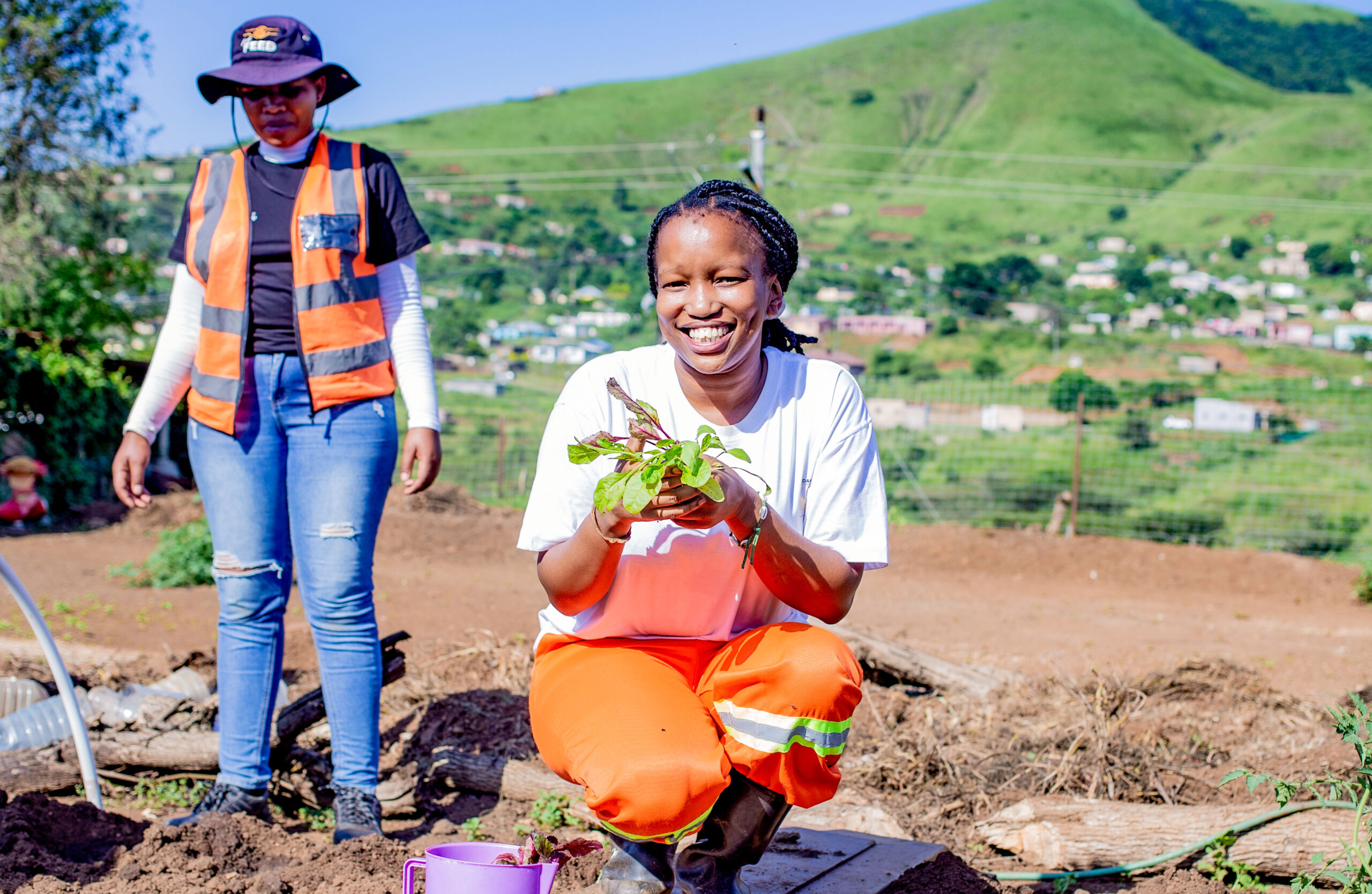by Naledi Sikhakhane
“Being busy doesn’t mean you are making money, I’ve been busy for three years, I’ve only started making money in the fourth year,” 23-year-old entrepreneur Ntobeko Mafu, told her class on a rainy day in February in Nhlazatshe, a rural area in the KwaZulu-Natal province in South Africa.
Mafu was standing in her garden presenting to 30 people who appeared to hold on to her every word as she detailed how she had created a sustainable small-scale broiler and crop farm.
Mafu is the founder and Chief Executive Officer at Madam Clucks A Lot and Madam Leafy Green. The former is a broiler-rearing enterprise, and the latter is a crop-farming enterprise.
The 30 trainees were the latest group amongst some 160 people Mafu has trained in just the past year, running them through the basics of running any business, including admin, marketing, and bookkeeping. Depending on their key interests, she then shares knowledge on either small-scale crop farming or small-scale chicken farming.
Some of the people she has mentored have gone on to start their own businesses, according to Mafu, who in just four years has also won multiple business pitching and incubation programs offering moderate grants and prizes that have helped her further her business.
It all began, she explained, with the cathartic exercise of trying to heal and motivate herself through writing. She ended up publishing a book titled “Letters to Whoever Needs to Hear This, Notes from Me to You.”
After falling pregnant at 16, Mafu subsequently lost her father. She spent months taking care of him in the lead-up to his death – a process that ended with her resolving to make a success out of her life to honour her father and provide for her son.
Her broiler business took off in 2021 using proceeds from the sale of her book. She was 20 at the time, studying towards a diploma in human resources management, and a single mother. She managed to buy chicks, build a suitable building to grow them, buy chicken feed, and provide the lighting needed to keep her chickens warm. Then she bought the machinery to help pluck chickens faster.
The training she provides is another part of her business.
“Usually in an area like this, we don’t get things like this. I aim to make sure rural communities are empowered, not just mine but all rural communities,” Mafu said of her training and development programmes.
Mafu said she believes that in contributing to a food-secure South Africa, she is also tackling issues like gender-based violence and its link to food insecurity
The programmes she offers vary. Some are for two months, where trainees can fully delve into each subject. Then there are crash courses that include learning materials and resources for where to go next for funding, more training, and how to leverage social media for marketing and networking.
On this day, she showed her trainees how to use a plucking machine. Trainees were both impressed and inspired, with some explaining how the classes had helped them with their own enterprises.
“I would lose my stock so maybe out of 30 chicks, 15 would die. I started having chickens without any knowledge. Right now my chickens have grown for the past 8 weeks, they should be good to sell but they are not selling because they are too small. Ntobeko helped me realise I wasn’t feeding the chickens correctly or vaccinating them,” one trainee who chose to remain anonymous, said.
Nontethelelo Zondi, 33, from KwaSaymane in KwaZulu-Natal, said the knowledge she had gained from the training was invaluable.
“We plant in KwaSaymani African potatoes, corn, spinach and other vegetables so it’s part of me to do agricultural activities. I came here to learn how to do it well as a business person, I came across her advert on Facebook, and I’m glad I came,” she explained.
“I have a business I started because unemployment is rife, I appreciated the knowledge on where to go for funding and equipment assistance because that was one of the challenges I had,” Zondi added.
Vishwas Satgar, a long-time activist and co-founder of the South African Food Sovereignty Campaign and the Climate Justice Charter, said women like those Mafu trains are at the forefront of sustainable small-scale food production.
Satgar, who has conducted research on agroecology and food sovereignty centres that allow participants to feed themselves, in villages, towns and cities, added that the growing need for food systems outside of the increasingly monopolistic industrial food system was highlighted by people having to travel long distances to buy produce in supermarkets when more sustainable foods could be grown at home.
“We should place indigenous knowledge at the centre of food production. Women are custodians of knowledge, they are custodians of methods for creating seed banks, they are in the field experiencing and coming up with knowledge on food sovereignty pathways and mainstreaming food sovereignty in the way we want,” said Satgar.
But growing that food is not always easy. Even Mafu has faced extreme challenges.
Madam Clucks A Lot faced closure in 2023 when rolling electricity blackouts – termed load shedding in South Africa – reached their peak and electricity would be out for eight to 10 hours a day. This resulted in her 650 chickens dying.
“I still have a trauma from that, they packed up on top of each other, trying to keep warm, and they died,” Mafu explained.
In the aftermath, without any more income, she strengthened her crop farming business Madam Leafy Green, which sells organic plants.
“I believe every household should have a food garden. The food we are consuming from stores is genetically modified and people should understand that is part of the reason we are not living up to 100 years old as our elders did. It’s important to know the difference between genetically modified food and organic food and invest in organic food,” said Mafu, who, in many ways, is a prime example of how young Africans already have the solutions they need to deal with the poly crisis of hunger, inequality and climate change.
Most of her business and farming acumen, she explained, comes from values and tips passed down to her by her father, who was taught by his parents.
However, other challenges that the young woman has faced, are more personal.
“People will ask you to do something that is against your values. In that case, I always say I would rather lose the opportunity than my integrity,” said Mafu.
As an example, Mafu explained that after speaking on a national radio show about the challenge of losing her chicken stock due to load-shedding, a businessman offered her an energy inverter and then began chatting her up, asking for a romantic relationship. She declined and let the opportunity of receiving an inverter go.
A week after the interview with Bird Story Agency, Mafu travelled to Berlin, Germany, through the BeVisioners program. The program aims to get youth across the world to come together to chart a path towards sustainable development and an environmentally friendly agro-economy. This was her second time abroad; in 2023, she travelled to Asia for a young leadership, training, and sharing conference.
She explained that despite sometimes being targeted as a young female entrepreneur, she believes it is her ‘superpower’.
“I have received funding two times by the Durban University of Technology, and once by the NYDA (National Youth Development Agency). This funding totals 150 000 rands (US$7,779),” she said.
Mafu said she was always looking out for opportunities to learn and exchange ideas, and for every program she has been accepted into, she also saw many of her proposals rejected. Like many entrepreneurs, felt she could do more to make an impact.
Her latest idea is to involve young people in her training programs.
“The youngest participant in my training is a 13-year-old who dreams of merging tourism and agriculture,” Mafu said.
That 13-year-old trainee, Elihle Mdluli, has big dreams of his own.
“I learnt how to keep the environment I work in clean, I want to be able to have my own farm where I will make it a holiday destination as well. I like tourism and agriculture. We learn agriculture at school, but we haven’t learnt how to do a business. I want to go around surveying businesses that are in agriculture so I learn to succeed,” Mdluli said.
Today, Mafu employs 14 people and has a couple on an ongoing mentorship. She believes the sky’s the limit for African youth currently and she said she feels fulfilled when she helps usher anyone toward finding or creating an opportunity.
“The obstacles in farming are; diseases, they come and go as fast; there are challenges with power; and water scarcity. But there are also a lot of great opportunities as the youth in Africa, there are a lot of organisations who are looking to invest in the youth in Africa,” the young entrepreneur said.
Bird story agency
Ntobeko Mafu, a 23-year-old entrepreneur from Nhlazatshe, South Africa, has built a successful small-scale broiler and crop farming business and trained over 160 individuals in business basics and farming techniques. Known for her enterprises, Madam Clucks A Lot and Madam Leafy Green, Mafu started generating income in her fourth year after initial struggles. Her journey began at age 16 after her father's death and her pregnancy, motivating her to write a book that financed her broiler business.
Mafu's training programs empower rural communities by covering essential business skills and practical farming knowledge. Trainees have reported substantial improvements in their farming practices and business acumen, resulting in greater food security and economic opportunities.
Mafu has faced significant challenges, including power outages that almost shut down her broiler business. However, she pivoted to strengthen her crop farming operations. Dedicated to promoting organic food, she emphasizes the importance of sustainable food production and the risks of genetically modified foods.
Despite personal and professional hurdles, Mafu continues to seek learning and funding opportunities, having received various grants and participating in international programs. She employs 14 people and mentors others, believing that African youth have limitless potential in agriculture.
Her latest initiative involves training young people, exemplified by a 13-year-old trainee aspiring to merge tourism and agriculture. Mafu's commitment to fostering young talent and addressing issues like gender-based violence through food security underpins her broader impact on her community and beyond.






